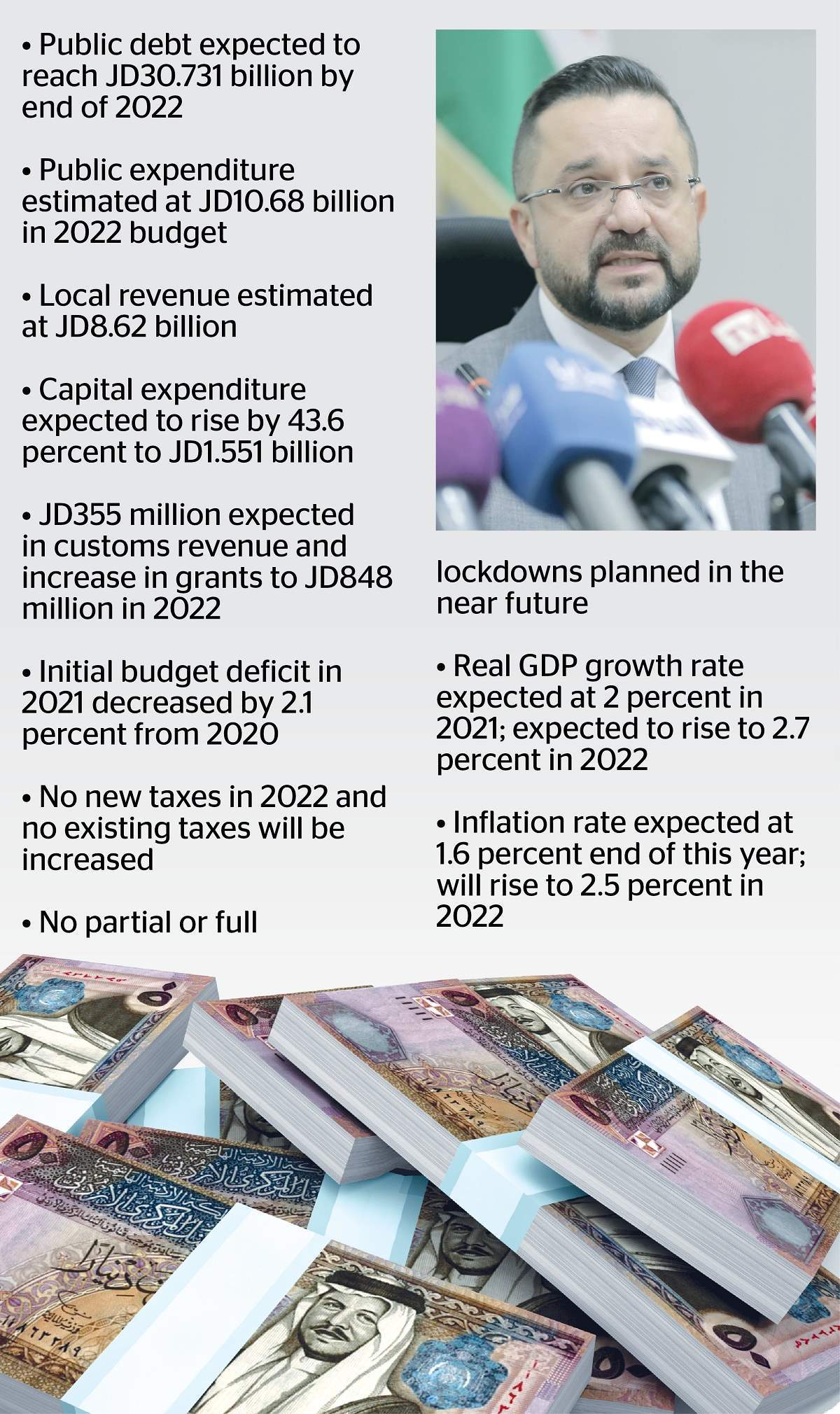AMMAN — Minister of Finance Mohamed Al-Ississ said
that the government seeks to boost the economy next year, pointing out that the
general budget will see an increase of capital expenditures by 43.6 per cent
compared to the current year's budget.
"This year, the national economy achieved a reduction in
the budget's initial deficit by 2.1 per cent compared to 2020, and by 0.8 per
cent above projections in the same budget," Ississ said in a press
conference held with Minister of State for Media Affairs Faisal Shboul on
Sunday.
Ississ added that the International Monetary Fund (IMF) has
commended Jordan's performance, which has struck a balance between health and
economy, according to the Jordan News Agency, Petra.
The
finance minister denied any intention of imposing "partial or blanket
lockdowns" due to the COVID-19 pandemic, noting that the cost of the government’s
coronavirus health response is much less than the cost of a lockdown.
Ississ said that the principle of self-reliance, which the
government is committed to, is one of the most important economic indicators
for any country, explaining that the self-reliance index reached about 74 per
cent in 2020 and "we will increase it to 88.5 per cent in 2022."
With regard to taxes, Ississ reaffirmed that there is no
increase in taxes in the 2022 budget, noting that the combating tax and customs
evasion policy has enabled the government to continue to avoid introducing any
taxes.
He said that the total public debt will reach JD29.448
billion by the end of this year, after excluding what is borne by the Social
Security Investment Fund, at a rate of 91.6 per cent of GDP.
He explained that JD279 million was allocated to the
government's work priorities program, as well as the health sector's
allocations to combat the COVID crisis, which aim to provide the necessary
health care for citizens, and allocations for youth employment worth JD80
million.
He further added that transparency is a key goal of the 2021
budget, as it contributes to assessing and enhancing financial stability. Allocations
for attracting tourism investment have been increased in the 2022 budget, as
have the allocations of the National Aid Fund.
Ississ said that Jordan has achieved real growth of 2 per
cent at the end of 2021, expecting a 2.7 per cent growth next year, and a 2.5
per cent inflation. He also expected customs and tax revenues to amount to
JD355 million in 2022.
Furthermore, the minister said that public sector salaries
still constitute the vast majority of current expenditures at 66 per cent,
followed by the public debt service at 15.6 per cent, explaining that civil
apparatus salaries amount to JD1.9 billion in 2022.
He said that the government’s role is not employment but
ensuring the financial and monetary stability of the economy; an economy that
stimulates private-sector job creation.
Read more National news
(window.globalAmlAds = window.globalAmlAds || []).push('admixer_async_509089081')
(window.globalAmlAds = window.globalAmlAds || []).push('admixer_async_552628228')
Read More
Industry Minister: US Tariff Regime Global in Scope, Not Jordan-Specific
Extension of Registration Period for the General Secondary Examination by 3 Days
2.9 Million Transactions Processed Through Comprehensive Government Service Centers by March
AMMAN —
Minister of Finance Mohamed Al-Ississ said
that the government seeks to boost the economy next year, pointing out that the
general budget will see an increase of capital expenditures by 43.6 per cent
compared to the current year's budget.
"This year, the national economy achieved a reduction in
the budget's initial deficit by 2.1 per cent compared to 2020, and by 0.8 per
cent above projections in the same budget," Ississ said in a press
conference held with Minister of State for Media Affairs Faisal Shboul on
Sunday.
Ississ added that the
International Monetary Fund (IMF) has
commended Jordan's performance, which has struck a balance between health and
economy, according to the Jordan News Agency, Petra.
The
finance minister denied any intention of imposing "partial or blanket
lockdowns" due to the COVID-19 pandemic, noting that the cost of the government’s
coronavirus health response is much less than the cost of a lockdown.
Ississ said that the principle of self-reliance, which the
government is committed to, is one of the most important economic indicators
for any country, explaining that the self-reliance index reached about 74 per
cent in 2020 and "we will increase it to 88.5 per cent in 2022."

With regard to taxes, Ississ reaffirmed that there is no
increase in taxes in the 2022 budget, noting that the combating tax and customs
evasion policy has enabled the government to continue to avoid introducing any
taxes.
He said that the total public debt will reach JD29.448
billion by the end of this year, after excluding what is borne by the Social
Security Investment Fund, at a rate of 91.6 per cent of GDP.
He explained that JD279 million was allocated to the
government's work priorities program, as well as the health sector's
allocations to combat the
COVID crisis, which aim to provide the necessary
health care for citizens, and allocations for youth employment worth JD80
million.
He further added that transparency is a key goal of the 2021
budget, as it contributes to assessing and enhancing financial stability. Allocations
for attracting tourism investment have been increased in the 2022 budget, as
have the allocations of the National Aid Fund.
Ississ said that Jordan has achieved real growth of 2 per
cent at the end of 2021, expecting a 2.7 per cent growth next year, and a 2.5
per cent inflation. He also expected customs and tax revenues to amount to
JD355 million in 2022.
Furthermore, the minister said that public sector salaries
still constitute the vast majority of current expenditures at 66 per cent,
followed by the public debt service at 15.6 per cent, explaining that civil
apparatus salaries amount to JD1.9 billion in 2022.
He said that the government’s role is not employment but
ensuring the financial and monetary stability of the economy; an economy that
stimulates private-sector job creation.
Read more National news


